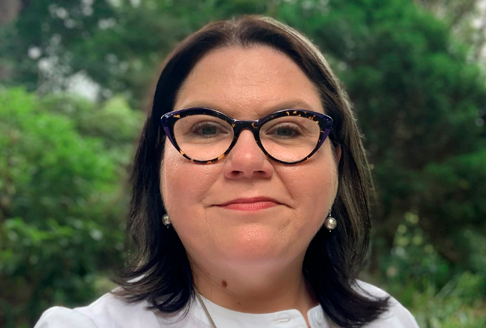Spiritual Care Week 23-29 October | Faces of Baptcare #28 - Nalissa Maberly
- 28 Oct 2022

What is your role at Baptcare and can you describe a typical day in your job?
My role is Spiritual Care Supervisor – Family, Community, Disability and Housing (Acting). I don’t really have a typical day, as I work with the team at Sunshine, supporting Spiritual Care Coordinators in Hobart, Launceston and Brunswick. One type of day is working from the FACS office in Sunshine — this will involve connecting with staff and it may include offering a reflection for a staff meeting. It may also include a conversation had with coffee in hand, while taking a fresh air break. Currently, the spiritual care process for clients is under review and we are working to create a best practice model to more effectively support the client experience and outcomes. This means I will be attending and learning from various programs. I am also providing support to my team depending on their needs.
What do you like about working with Baptcare and in the FACS space? Or can you share a particularly special work day/customer interaction you’ve had recently?
I really enjoying working with the FACS team. They are such a motivated, passionate, caring and fun team. They are constantly looking for ways to not only support their clients but also give voice to the issues. This month they are doing 16 Days of Activism against family violence.
Did you always want to work within the spiritual care space?
I didn’t have any aspirations to work in the spiritual care space. I came to it unexpectedly while working at a hospital ER as an Admissions Clerk on a break from a church-based ministry. Needless to say, I never returned to church-based work and have worked in the spiritual care space across hospital, workplace, community and aged care sectors ever since. I am grateful for all the amazing people I have met, the stories shared, the many cups of coffee (of varying quality) and to see the passion people have to make a difference in their unique spheres. Spiritual Care spans the breadth of wonderfully mundane and routine to the exceptional. It can involve connecting with people during times of celebration or on the worst day of their life. Being there for these moments is a privilege.
How would you explain spiritual care to people who haven’t come across this role in an organisation?
Spiritual Care is working alongside and supporting people to reconnect or notice all that life is giving, and hopefully providing connection, meaning and purpose. It may also be marking events and celebrating people in an honouring way. It may be about taking a breath, pausing and reconnecting, reminding us of who we are and what we are here for. Hopefully Spiritual Care comes from the heart of the Baptcare identity, holding the history, supporting the present and also committed to the future of the people who make up this organisation.
What did you want to be when you grew up?
This was a constantly changing thing! As I lived overseas for most of my childhood, I wanted a job that involved travel (I even tossed up the idea of being a tour guide at one point!). There was the nurse phase, the lawyer phase, the management phase (this was an ongoing joke in my family, that I could manage and organise anything), and then my most serious phase, to work in international development. So, this past is not directly related to where I’ve ended up.
Can you tell us two surprising things about yourself?
I speak Thai.
Also, I love all forms of transport that aren’t cars – trains, ferry boats, airplanes…not so much buses. One of my favourite pastimes is to plan trips in weird parts of the world that involve trains, boats and anything that doesn’t involve a car or a plane.
Do you have a favourite quote or motto in life?
Not in a tight concise way, that could be my problem. I do, however, choose to remain open to what may come, plan well and then expect those plans to be disrupted! (In my experience, this is when the most memorable experiences are likely to appear!). Another belief is that people are always more interesting than you think they are, and that finding good coffee anywhere will lead to fellow travellers.
How would your friends describe you?
Thoughtful, creative, good sense of humour, a good listener and not rushed when it comes to conversation.
Do you have a mentor or idol?
I don’t really have a mentor or idol but what I do have is a ‘circle of elders’. These are people whose writing, music and thoughts have — and continue — to encourage me. Some of them are Brené Brown, Richard Rohr, Leonard Sweet, Joel McKerrow, Diana Butler Bass, Pádraig Ó Tuama.
Community news
-

Back to School Tips for Foster and Kinship Carers
Heading back to school can be exciting, but it can also bring up big feelings—especially for kids in care. Here are a few simple ways to help make the transition smoother.
- 17 Apr 2025
-

Easter Reflection from Emily Booth of our Spiritual Care Team
A few years ago, at Easter, I was staying with my sister and her family for the weekend. One afternoon we were all sitting around chatting and the kids were playing when my sister came into the room and placed a tray of fresh, warm hot cross buns on the table
- 16 Apr 2025
-

Student Volunteer Spotlight - Erin
Did you know that Baptcare has student volunteers at some of our Residential Aged Care communities? Our volunteers are an integral part of our Baptcare community, not only in residential aged care but across many of our programs and services. Volunteers provide essential connection, positivity and assistance to residents, clients and consumers.
- 04 Apr 2025
